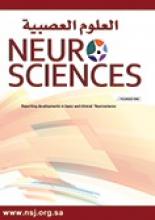Abstract
OBJECTIVE: To examine the effectiveness of repetitive transcranial magnetic stimulation (rTMS) in patients with treatment-resistant posttraumatic stress disorder (PTSD) with co-occurring major depression.
METHODS: We examined data on 20 male combat related PTSD patients admitted to the Post Traumatic Stress Disorder Clinic of Gulhane Military Medical Academy, Ankara, Turkey between January 2011 and December 2012 that received rTMS in addition to medical therapy. We obtained the data by examining the case files and hospital computer records.
RESULTS: Decreases in the Impact of Event Scale (IES) hyperarousal scores were statistically significant. However, there were no statistically significant differences between the total IES scores, IES intrusion scores, IES avoidance scores, Beck Depression Inventory, and Beck Anxiety Inventory scores before and after rTMS treatment.
CONCLUSION: The efficacy of rTMS on the hyperarousal symptoms indicated that rTMS could be used in the treatment of patients with treatment-resistant PTSD. The role of rTMS in the clinical management of PTSD should be identified in further comprehensive studies.
- Copyright: © Neurosciences
Neurosciences is an Open Access journal and articles published are distributed under the terms of the Creative Commons Attribution-NonCommercial License (CC BY-NC). Readers may copy, distribute, and display the work for non-commercial purposes with the proper citation of the original work.






